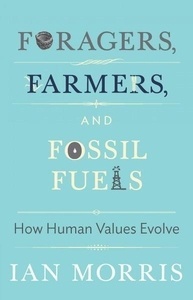Foragers, Farmers and Fossil Fuels
How Human Values Evolve

Editorial Princeton
Fecha de edición abril 2015 · Edición nº 1
Idioma inglés
EAN 9780691160399
400 páginas
Libro
encuadernado en tapa dura
Resumen del libro
Most people in the world today think democracy and gender equality are good, and that violence and wealth inequality are bad. But most people who lived during the 10,000 years before the nineteenth century thought just the opposite. Drawing on archaeology, anthropology, biology, and history, Ian Morris, author of the best-selling Why the West Rules for Now, explains why. The result is a compelling new argument about the evolution of human values, one that has far-reaching implications for how we understand the past and for what might happen next.
Fundamental long-term changes in values, Morris argues, are driven by the most basic force of all: energy. Humans have found three main ways to get the energy they need from foraging, farming, and fossil fuels. Each energy source sets strict limits on what kinds of societies can succeed, and each kind of society rewards specific values. In tiny forager bands, people who value equality but are ready to settle problems violently do better than those who aren't; in large farming societies, people who value hierarchy and are less willing to use violence do best; and in huge fossil-fuel societies, the pendulum has swung back toward equality but even further away from violence.
But if our fossil-fuel world favors democratic, open societies, the ongoing revolution in energy capture means that our most cherished values are very likely to turn out at some point fairly soon not to be useful any more.
Originating as the Tanner Lectures delivered at Princeton University, the book includes challenging responses by novelist Margaret Atwood, philosopher Christine Korsgaard, classicist Richard Seaford, and historian of China Jonathan Spence.
Biografía del autor
p b Ian Morris /b es doctor en Historia por Cambridge y profesor de Historia del Mundo, Arqueología y Cultura Clásica en la Universidad de Stanford, donde ha sido director del Departamento de Cultura Clásica, director del Instituto de Historia de las Ciencias Sociales y del Centro de Arqueología, así como decano adjunto de la Facultad de Humanidades y Ciencias. En 2009 fue galardonado con el Dean's Award por la excelencia de sus clases. Ha dirigido excavaciones arqueológicas en Gran Bretaña, Grecia e Italia.<br> p <br> p Morris ha publicado diez libros entre los que destacan i ¿Por qué manda Occidente por ahora? /i (premio Pen de No Ficción y fenómeno de ventas mundial), i Cazadores, campesinos y carbón y Guerra, ¿para qué sirve?, /i todos en Ático de los Libros. Ha sido galardonado con premios de la Fundación Guggenheim, la Fundación Mellon, la National Geographic Society y el National Endowment for the Humanities y es titular de la cátedra Jean y Rebecca Willard de Clásicos.<br>








